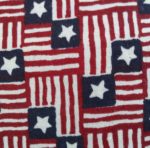 Presidential elections occurred in the United States for the first time in 1789. Basically George Washington ran unopposed. He received 69 electoral votes. John Adams won 34 electoral votes. Therefore, according to the Constitution at that time, Washington became president, and Adams became vice president. Children can check out an absolutely amazing website and see ANY presidential election result at: http://uselectionatlas.org/RESULTS/.
Presidential elections occurred in the United States for the first time in 1789. Basically George Washington ran unopposed. He received 69 electoral votes. John Adams won 34 electoral votes. Therefore, according to the Constitution at that time, Washington became president, and Adams became vice president. Children can check out an absolutely amazing website and see ANY presidential election result at: http://uselectionatlas.org/RESULTS/.

George Washington

Abraham Lincoln
Presidents’ Day is a national holiday. Originally meant to honor George Washington and Abraham Lincoln, this day honors all of our Presidents. Children could read Anne Rockwell’s book, Presidents’ Day. They could also visit the White House site to read a biography of every president, starting with George Washington, at: Presidents. Children could participate in some Presidential trivia. Which President served the least amount of time? Which President served the most amount of time? Which President received a patent? Which President went on to serve on the Supreme Court?
Robert Baden-Powell (born London, England, 1857; died Nyeri, Kenya, January 8, 1941) established the Boy Scouts and Girl Guides.
Frederick Chopin (born Zelazowa-Wola, Poland, 1810; died Paris, France, October 17, 1849) was a classical pianist and composer. He created more than 200 pieces for the piano as well as chamber music and orchestral arrangements. He played his first concert at age eight and began composing after that. He spent most of his adult life in Paris. He died of tuberculosis. His works, influenced by his Slavic background, are full of melody and rhythm.
Elisha Cooper (born United States, 1971) writes and illustrates books for children. In 2018 he earned a Caldecott Honor Award for Big Cat, little cat. Children can learn more at: Elisha Cooper.
Edward Gorey (born Chicago, Illinois, 1925; died Hyannis, Massachusetts, April 15, 2000) was an author and illustrator. He provided the odd illustrations in the books by John Bellairs and Brad Strickland. Children could learn more at: Edward Gorey.

Rembrandt Peale Self-Portrait
Rembrandt Peale (born Bucks County, Pennsylvania, 1778; died Philadelphia, Pennsylvania, October 3, 1860) was a painter, mostly of portraits. He was a member of the artistic and famous Peale family. Children could view a number of his works at: Rembrandt Peale.
Horace Pippin (born West Chester, Pennsylvania, 1888; died West Chester, Pennsylvania, July 6, 1946) was a painter. The grandson of slaves, he injured his right arm during battle in World War I. After the war, he returned to the United States and worked at various jobs. He developed his artistic talents and became a famous artist. Children could view a number of his works at: Horace Pippin.

George Washington
George Washington (born Westmoreland County, Virginia, 1732; died Mt. Vernon, Virginia, December 14, 1799) was the first president (1789-1797) of the United States. He fought in the French and Indian War as an officer of the Virginia militia. He led the Continental Army to victory during the American Revolution. He helped organize the new country by presiding over the Constitutional Convention. He was elected president unanimously by the electoral college twice. He refused to run for a third term. He has been called “The Father of Our Country.” Children could visit a website at: George Washington.
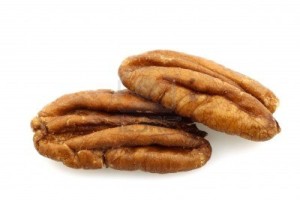
Pecans
Pecan Day marks the day in 1775 when Thomas Jefferson gave George Washington several pecan trees from his own plantings. Some of Washington’s pecan trees are still alive. The pecan, packed with phytonutrients and protein, is the only nut native to North America. Children could learn more at: Pecan.
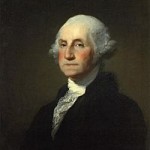
George Washington
George Washington was inaugurated President of the United States in 1789 in New York City. Idea: Present Presidents are inaugurated on January 20 in Washington, DC. Children could try to figure out why George Washington’s inauguration was in April (instead of January) and in New York City (instead of Washington, DC). They could also read a transcript of his speech at: http://www.archives.gov/exhibits/american_originals/inaugtxt.html.
United States Army Insignia
United States Army was created in 1775 by the second Continental Congress. The next day George Washington became commander of the new army.
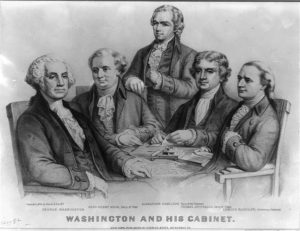 George Washington established his first cabinet in 1789.
George Washington established his first cabinet in 1789.
- Thomas Jefferson became Secretary of State.
- John Jay was appointed the first Chief Justice of the Supreme Court.
- Samuel Osgood was the first Postmaster.
- Edmund J. Randolph was made Attorney General.
- Henry Knox had become Secretary of War on September 12, 1789. The position was renamed Secretary of Defense in 1949.
Today the President’s cabinet is comprised of the Vice President and fifteen heads of departments. Children can learn more at: https://www.whitehouse.gov/administration/cabinet.
Battle of Yorktown commenced in 1781. George Washington and 17,000 American and French troops laid siege against General Cornwallis and 9,000 British soldiers in Yorktown at the mouth of the Chesapeake. French ships cut off his retreat into the bay. Cornwallis surrendered three weeks later on October 17, 1781. Yorktown was the last major battle of the Revolutionary War. Children could learn more at: Battle of Yorktown.
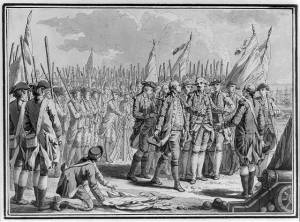
Cornwallis Surrenders
Yorktown Day marks the surrender of General Lord Cornwallis and his troops to George Washington in 1781. This surrender virtually ended the Revolutionary War. No other major battles occurred after this date, and the official peace agreement, the Treaty of Paris, was signed September 3, 1783. Children can learn more at: Yorktown Day.